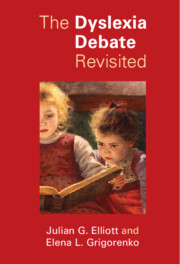Book contents
- The Dyslexia Debate Revisited
- The Dyslexia Debate Revisited
- Copyright page
- Contents
- Figures
- Table
- Foreword
- Preface
- Abbreviations
- Chapter 1 What Is Dyslexia?
- Chapter 2 Explanations at the Cognitive Level
- Chapter 3 The Neurobiological Bases of Reading Disability
- Chapter 4 Assessment, Instruction, and Intervention
- Chapter 5 Dyslexia
- Chapter 6 Conclusions and Recommendations
- References
- Index
Chapter 6 - Conclusions and Recommendations
Published online by Cambridge University Press: 30 March 2024
- The Dyslexia Debate Revisited
- The Dyslexia Debate Revisited
- Copyright page
- Contents
- Figures
- Table
- Foreword
- Preface
- Abbreviations
- Chapter 1 What Is Dyslexia?
- Chapter 2 Explanations at the Cognitive Level
- Chapter 3 The Neurobiological Bases of Reading Disability
- Chapter 4 Assessment, Instruction, and Intervention
- Chapter 5 Dyslexia
- Chapter 6 Conclusions and Recommendations
- References
- Index
Summary
This final chapter provides a series of conclusions and recommendations for the way forward. In the light of the experience of the past decade, this chapter recommends the continued use of the term dyslexia to describe a severe and persistent difficulty with accurate and fluent reading. However, it is recommended that the use of the term dyslexia as a diagnosed label or category for specific individuals should be discontinued. The importance of removing the existing arbitrary distinction between dyslexic and nondyslexic poor readers and the rejection of the expanded use of the term to incorporate a wide range of cognitive strengths and weaknesses is explained. The implications of these recommendations for the development of teacher expertise and educational practice are outlined.
- Type
- Chapter
- Information
- The Dyslexia Debate Revisited , pp. 285 - 299Publisher: Cambridge University PressPrint publication year: 2024



